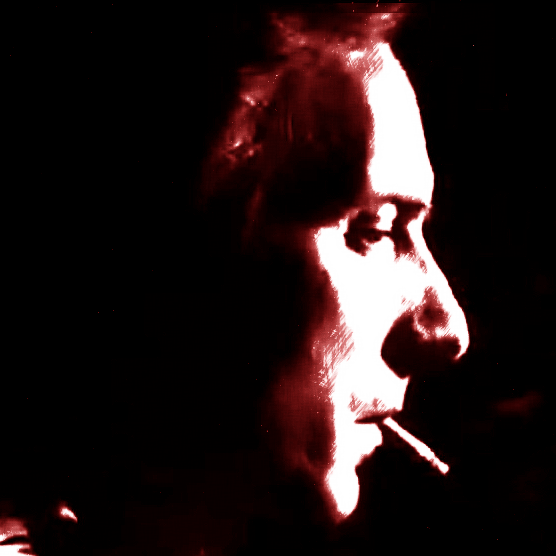I started writing about Pain and Glory (Dolor y Gloria) and then I knew I couldn’t post it due to spoiling the whole movie for any person who hasn’t watched it yet.
And it’s quite possible you have no clue what I’m talking about.
But, that’s OK.
Find it and watch it. Pain and Glory, that is. Watch it! And I’ll soon enough post my opinion/analysis of it.
Until then, let me (as if you have a saying over this) share my thoughts about Law of Desire (La Ley Del Deseo). This is a strictly character analysis (big word here… affection is the right one), I have no intention on analysing cinematography or the script or the beautiful shots of all the beautiful people Almodóvar used to tell one version of his story.
It is written and directed by Pedro Almodóvar. It was released in February of 1987, so it was most probably shot in the previous year. It was the first film Almodóvar made independently with his own production company El Deseo.
Law of Desire was Almodóvar’s first work centred in homosexual relationships exploring the unrestrained force of desire. Its themes are: love, loss, gender, family, religion, abuse, sexuality and the close link between life and art.
The story is set in Madrid and other towns, and follows the story of Pablo, a movie and theatre director and screenwriter, and how unwillingly his actions bring tragedy to the lives of those he loves. Tina Quintero is his sister, an actress, mostly working with and for him. She’s the guardian of a ten year old girl, Ada. Juan is Pablo’s young lover. Antonio is a young man who becomes obsessed with Pablo as a person and as an artist. Their lives will become intertwined in ways that will change them and their relationships forever.
If you haven’t watched Law of Desire, this is the right moment to click back. What follows is full of spoilers. And lot’s of adoration. It’s sickly sweet how much adoration you’ll find here.
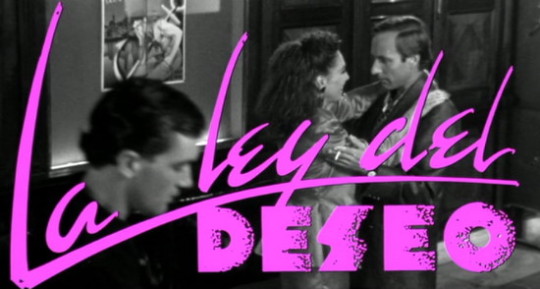
Synopsis
Pablo Quintero is a successful gay film and theatrical director whose latest work, The Paradigms of the Mussel, has just been released. The opening scene of La Ley Del Deseo is a scene from his movie; kind of pornographic, solo male masturbation scene of a young man under the direction of two older men.
For his next project, Pablo writes an adaptation of Jean Cocteau’s monologue-play The Human Voice, to be performed by his sister, Tina.
He’s a multi-dimensional artist.
At the opening night party, he discusses with his much younger lover, Juan, their summer plans. Pablo will stay in Madrid working on a new project, while Juan will leave for his hometown to work and be with his family. Juan asks Pablo to visit him so he can show him the Trafalgar Lighthouse. His proposition is met with refusal because Pablo has to work on his play.
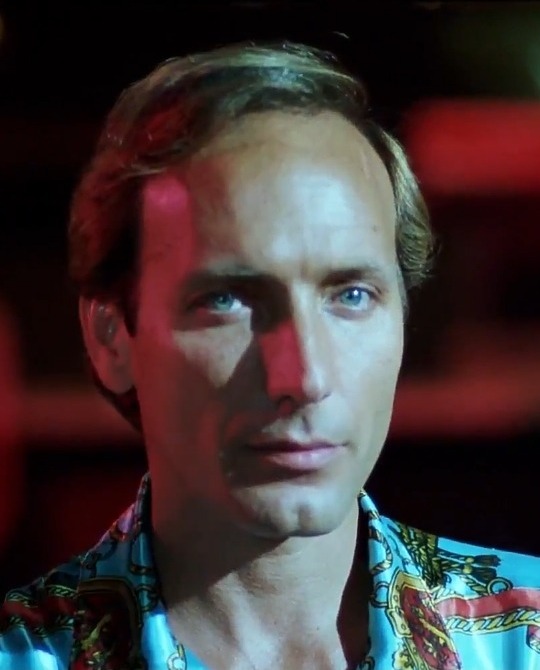
Pablo fancies himself in love with Juan. He also believes that Juan doesn’t love him back [the way he wants to be loved]. Juan is seen at the after premier party flirting with a pretty girl (Victoria Abril). Which leads Pablo to leave his own party after getting picked up by a young model who «wants to be an actor». Pablo takes him home and puts up with him, while high as a kite and tired to the bones, until the model wonders if he can play the part in the Human Voice, that Pablo plans to stage, after the director explained to him it’s a female part. And that’s when Pablo asks him to leave. A good thing to do because Juan has dumped the girl and followed Pablo home.
Pablo’s relationship with Juan is focused on the basis that it’s unrequited. Pablo believes himself to be madly in love with Juan, while he also believes the younger man doesn’t love him back.
«It’s better you’ll leave so I’ll get over it,» he says to Juan.
to get the reply
«I don’t want you to get over it.»
After Juan’s departure, Pablo gets a card by Juan, clearly showing his lover hasn’t forgotten him as he asks him for the third time to go and visit him, but Pablo isn’t satisfied by it, so he replies with a letter. In this letter he asks his lover to send it back pretending it’s written by him (by Juan).
Confusing? Personally, it took me some while to understand what on earth was going on here. I blame the subtitles, both the Greek and English ones.
Let me rephrase, Pablo got a card with a lighthouse of his hometown, which Juan wanted Pablo to see, telling him he’s (Juan) missing him (Pablo), but the words weren’t the ones he (Pablo) wanted to hear (or read in this case) so he wrote his own words for Juan to send to him.
«Dear Juan, I got your card. It’s nice, but not what I expected. I’ll send you a typed letter. Please signed it and send it back. I long for you as ever.«
and he sends him this as well
«I didn’t leave Madrid to forget you. If I ever did, as you advised I should I’d end up empty inside. Tell me what you’re up to, what books you’re reading, what movies you’ve seen. What records you’ve bought. Have you given up coke? I want to share everything with you. Except, if you’ve someone you fancy. I couldn’t share that. I want to see you. You decide when.
I adore you.»
to be signed by Juan and returned to him as if it was written by Juan.
I’m not exactly certain what Pablo desires, but Juan’s letter wasn’t it. Pablo’s fingers are long, though, as they type the letter, so we forgive him.
Pablo has a close relationship with his sister, Tina, who is an actress and has been abandoned by her female lover, who left her in charge of her ten year old daughter, Ada. Tina has a loving relationship with Ada, while she has given up on relationships with men. She, Pablo and Ada have formed a close bond and are seen by the viewer as a family. Ada is happy living with Tina and has a childish crush on Pablo, who looks after both of them, emotionally and financially.
As the story progresses, Tina, with Ada, visit a Church in which she had been a pupil, where she confronts a Priest who had molested her as a child. The Priest has supposedly changed his ways and asks her to forget while Tina proclaims «memories are all I have left». There is another instance she claims the same, during a fight with her brother when she believes he’s using her life experiences in his new play. Despite the fact it’s a role written for her by her brother, Tina refuses to listen to him. Her memories are important to her, and even those that clearly are the basis of abuse towards her is something she treats are precious.
The night of the movie premiere («The Paradigms of the Mussel» I think is its title) is where the third most important person of the movie, Antonio, gets involved. He becomes obsessed with Pablo (and his movie), and follows him around like a kicked puppy. Not exactly, but close enough.
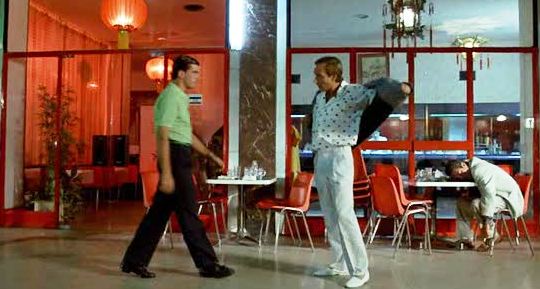
At the play’s (The Human Voice) opening night, Pablo meets Antonio. At the end of the evening they go home together and have sex. For Antonio this is his first homosexual experience, while Pablo considers it just a one night stand. Pablo is after all, still in love with Juan. Debatable, but still… that’s what Pablo thinks so we’ll go with his opinion on the matter. Antonio wants to misunderstand Pablo’s intentions and takes their encounter as a relationship. He soon reveals his possessive behaviour as a lover.
- He is shown watching a tv interview of Pablo, being really interested in what he has to say about love and what he wants in a life partner.
- Antonio gets a shirt identical to Pablo’s.
- He snoops around his house reading his play and or movie notes about his new character.
- He fixes everything that is in need of fixing in Pablo’s house.
- He tries to take very good care of him.
He comes across the love letter addressed to Pablo, signed by Juan, but which was written by Pablo to himself . He falls into a jealous rage leaving a note calling Pablo a molester. But when he returns, because he can’t stay away, Pablo accepts him back and then their one night stand becomes a bit more. Then he has to return home, to a domineering German mother.
Even though we don’t get to know Antonio exact age, he must be in his early twenties while Pablo is in his late thirties. The viewer wants to scream to Pablo that he’s an idiot and he should close the door to Antonio’s face, but the idiot takes him back to his bed. Oh well…
«Antonio, darling, you may think so, but I’m not in love with you. I’m touched by your tenderness. But don’t fall in love with me. I’m too selfish, I couldn’t share my life. Thank you and good luck.»
Well, you can’t say Pablo didn’t at least try to get rid of him. But he didn’t try it strongly enough.
«My Mom is German, she likes to spy, so don’t sign with your name, but with a female one«, he says to Pablo in one of the most comedic scenes of the movie that follows a fight between the two. Pablo has no idea what Antonio is talking about, while Antonio lives in his own happy world where he and Pablo are in a loving relationship which has to be hidden from his mother, after being consoled by Pablo that he and Juan are not lovers and he was the one who wrote the letter Antonio read.
It wouldn’t be an Almodóvar movie if it wasn’t complicated.
For some peculiar reason, as he doesn’t seem to be in any way interested in Antonio, Pablo ends up sending letters to Antonio using his new female protagonist’s name, Laura P, the one he created to be played by his sister. Until he gets bored and sends Antonio a letter telling him he loves Juan and intends to join him.
“Antonio, I don’t love you. I’m still in love with Juan. I won’t come to see you. I’m going to see Juan. Forget me. I never lied to you. Laura P.”
He has already spoken with Juan on the phone. Juan asked him why he didn’t return his letters.
To make it clear, Pablo sent letters signed Laura P. to Antonio, but didn’t reply to Juan. The latter tells him on the phone:
“I can give you want you want, if you teach me. Pablo, I love you.”
At this point, I’m trying to understand every review of this film I have ever read in which it says Juan doesn’t love Pablo. Have we watched the same movie? Just because Pablo says it, it doesn’t make it true. Pablo is an unreliable narrator.
And the drama begins
Antonio wants to possess everything that belongs to Pablo. He got to find Juan first while wearing the same shirt as Pablo’s, and tries to have sex with him in the same place Juan wanted to show to Pablo. The light house. Remember the lighthouse? It will see a crime. When Juan rebukes his advances, Antonio pushes him off the cliff. Or Juan falls during their fight. Either way, Antonio shows no remorse or guilt.
After killing Juan, Antonio quickly returns to his hometown.
Do we remember that Antonio wears the same shirt Pablo has? We do.
The next day, Pablo wearing the same shirt, goes to Juan’s hometown to visit him (and see the lighthouse) and he becomes a suspect of the crime because the police have found in Juan’s fist a piece of clothing that matches his shirt.
After seeing Juan dead and being interviewed by the police, Pablo goes to see Antonio where he realizes that Antonio is responsible for the murder and confronts him about it. They have an argument and Pablo drives off pursued by the police.
Blinded by tears, he crashes his car injuring his head. He awakes in a hospital suffering from amnesia.
Antonio’s mother shows the police the letters her son received signed Laura P. The mysterious Laura P becomes the prime suspect, but the police cannot find her, but the police suspects Tina as they find Pablo’s notes about her.
Antonio returns to Madrid and, in order to get closer to Pablo who is still in the hospital, seduces -offscreen- Tina who believes his love to be genuine.
To help her brother recover his memory, Tina tells him about their past. Born as a boy, in her adolescence she began an affair with their father. She ran away with him and had a sex change operation to please him, but he left her for another woman. When her incestuous relationship ended, Tina returned to Madrid, coinciding with the death of their mother, and got reunited with Pablo. Tina’s affairs with men were her molestation from the priest and her relationship with her Father. She insists she loved their Father. Pablo is strangely calm about it, rather zen if I could describe it such, other than wanting to know more because «he’s his father too». According to Tina, her father wanted her to have the sex change, and she would do anything about him.
While it becomes clear she doesn’t see that relationship as abusive, what else could it possibly be? At Pablo’s question she tells him that eventually she’d have done the sex change regardless their father’s wish.
Tina has been grateful to Pablo who did not judge her. Tina also tells him that she has found a lover. Pablo gradually begins to recover, but doesn’t tell anything to the police about Antonio killing Juan until he realizes that Tina’s new love is Antonio and that she is in danger. He goes with the police to Tina’s apartment where she is being held hostage by Antonio. Antonio threatens a bloodbath unless he can have an hour alone with Pablo. Pablo agrees and joins him. They maybe make love and Antonio commits suicide, dying in Pablo’s arms.
The end
The truth is, unless someone wants to write a book and I’m sure books have been written about “Law of Desire”, you have to decide what parts of it moved or caught your attention the most and stick with and to them.
So, that’s what I’m going to do.
I love Law of Desire, even if I have the tendency of usually write “attraction”, delete and replace with “desire”. “Deseo” translates to desire, not attraction. So, I often use the original Spanish title.
I didn’t love it the first time I watched it. I didn’t hate it either, but I was a bit overwhelmed by the… well, desire and underwhelmed by the protagonist. But then I watched Matador (Pedro Almodóvar, 1986) where the same actor had a supporting role and was taken by him. So, I rewatched the movie and it caught me unprepared. I went from being underwhelmed by him to not being able to take my eyes off him.
It happens.
This is where I’d have added a long, well researched description of the events taking place in Spain between the interwar period and the time the movie was made. Basically, the civil war, the four decade long dictatorship (1936-1975) and what followed from the mid 70s to 1987. I’m sad to admit I didn’t know much about Spanish history, but that has changed and I’m fascinated by it.
What is a matter of interest here is how Pedro Almodovar came to prominence as a director and screenwriter during La Movida Madrilena, a cultural renaissance that followed after the end of Francoist Spain. His first few films characterised the sense of sexual and political freedom of the period.
La Movida Madrilena (The Madrid Scene) was a countercultural movement that took place mainly in Madrid during the Spanish transition after Francisco Franco’s death in 1975. The movement coincided with economic growth in Spain and the emergence of a new Spanish identity. The «Concierto homenaje a Canito» («Canito Memorial Concert»), taking place on February 9th, 1980, is widely considered the traditional start date of La Movida Madrilena.
This hedonistic cultural wave was born in Madrid, then appeared in other Spanish cities, such as Barcelona, Bilbao and Vigo. It was characterized by freedom of expression, transgression of the taboos imposed in Francoist Spain, use of recreational drugs, the «coming out» of the Madrilenian cheli and the «pasota» dialect and a new spirit of freedom on the streets.
Clearly, no one has to know all of that to understand and like the movie though so, while I keep the knowledge to myself, I won’t tire the reader with it (now, I feel like Jane Eyre)
Reader, I married him… well, no.
Reader, I liked the movie. I liked the 80s atmosphere, I liked the script, I liked the characters. I liked the actors. I loved the director and the lead actor. But here I will write about the characters.
Sexuality doesn’t play as important role here, as someone might imagine. It’s as it is. It wouldn’t make a difference if they were heterosexuals. Almodóvar doesn’t ask for bonus, he tells the story he wants to tell and celebrates the characters as they are. It’s refreshing. Strange how I say that for a movie my own age. Almodovar doesn’t use his work to take revenge or demand equality. He does it and transform it into art in an era and in a country that could stop his career in his entirety.
Despite Almodóvar himself, I don’t see La Ley Del Deseo as a melodrama.
I see it as a tragedy [with elements of melodrama, mostly scenario/cinematography related]. The characters are too complicated, the plot is run by them not by some moustache twirling villain, and the end is neither absolving nor happy.
I will not focus at all in the drug usage. Everyone, except for Antonio, sniffs cocaine. Everyone.
I will not focus on Tina’s transexuality. In my opinion, the story and the casting are amazing in connection to what the movie tells. The fact a transexual actress (Bibi Andersen) plays Ada’s biological mother is also a bonus, considering Carmen Maura plays Tina.
I am a character driven movie fan. Give me well written characters who act, not merely react to situations created by others. Give me well acted characters. They are far more important to me than the camera ankle, the transitions between the scenes and the bleak or beautiful scenery. And Almodóvar is great at those too. But his characters! Oh his characters.
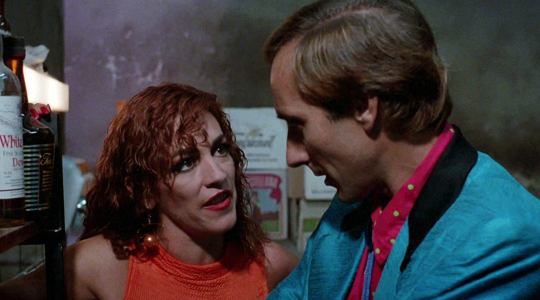
One of the most loved characters of the movie is Tina Quintero. Is she her brother’s satellite? Or is it the opposite, is Pablo her satellite? They have a beautiful relationship, they stand next to each other and she gets the protection, safety and affection she needs from him. It’s clear from the start that she hides something (a reporter asks her if she became a lesbian, Antonio asks Pablo if his sister is a transexual almost as he enters his house to which we get to see a once again protective Pablo), she has embraced her secrets as a loving lover. While she never accepts or says or describes what happened to her was abuse, we see her at times looking suspiciously towards her brother and Ada, despite even the fact he’s gay.
«He’s old enough to be your father.» She says to Ada.
«I wish!» the girl replies and by the end of the movie this dialogue sounds a bit off and different than when the words were uttered.
Her affection and protective instincts towards Ada are so valued that the girl decided to stay with her even as her biological mother asks her to go with her.
She’s the major character that brings the theme of religion to the story. She used to be a soloist in a Church’s choir. She takes Ada to the Church where the latter decides to take her first communion. They make a cruz de mayo in their home, most probably a bit later than May 3rd.
When Tina performs in Jean Cocteau’s monologue play The Human Voice under Pablo’s direction Brel’s “Ne me quitte pas” (see later for more) is lip synced by Ada in the play. The sentimentality of the song shows Tina’s loss in regards to her love for Ada’s mother, and Ada’s own feelings fearing that she is going to be separated from Tina, her surrogate mother. Tina’s female lover abandoned her, and while she returns to ask for her daughter to go with her (which is denied) she has also found a new lover, leaving Tina alone once more.
Tina has declared she has given up men after her two traumatic experiences. Despite the trauma and the experiences that led to her sex change, Tina is her new identity. According to her, it would have been her future either way. Even if she did it because she was ready to do anything for her father/lover, she seems positive it was her own choice. After Pablo’s accident she meets and falls in love with a man. She shares her news with Pablo in the hospital.
When she understands there’s some kind of an affair between Antonio and Pablo, she feels betrayed not only by the first but by her brother too. “I hate you both,” she says to them and because Antonio doesn’t care if she hates him and she knows it, the viewer is left with the impression it is a sentiment mostly directed at Pablo.
In the end, without any culpability from his part, Pablo harmed her too.
Juan Bermudez is Pablo’s lover. He’s seen sniffing coke with Pablo in the bathroom during the after movie premiere. He informs Pablo of his plans to go home for the summer to work and be with his family. He tells him he could stay if Pablo wanted to. He tells him Pablo should visit him so they could go see the lighthouse together. He cares about Pablo getting rest and doesn’t want to be away from him. In both asks, Pablo declines. He wants to stay in Madrid and work and Juan should go home.
Then, Pablo sees a young woman flirting with him.
When Juan goes to see him in his place afterwards, he is hurt he left without goodbye.
Pablo says:
It’s not your fault if you don’t love me and it’s not my fault if I love you.
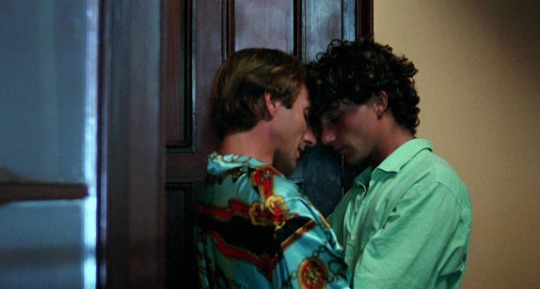
while we listen to Maysa Matarazzo’s version of Jacques Brel’s “Ne me quitte pas”
In the film the song is associated to Pablo’s love for Juan. The song begs the lover not to leave and promises a different world should the lover stay. It is a song of despair full of poetic images. The singer promises to “offer you pearls of rain that come from countries where it doesn’t rain, I will create a domain where love will be king, where love will be law, and where you will be queen«.
It’s an oxymoron though because Juan does want to be with Pablo. After Juan’s death/murder, one of the police officers met with Pablo is revealed to be Juan’s childhood friend. He says Juan talked to him about everything and that Juan told him he loved Pablo. A reminder this is Spain in the 80s and Juan told his best friend who was a cop that he was in love with Pablo.
Other than asking Pablo not to make love (and that’s assuming the English translation is correct, because the Greek was different and made no sense) the night before he leaves from his hometown in Cádiz, his behaviour was that of a man in love.
Juan got a visit from Antonio who told him he was Pablo’s friend. He took him to a craggy hill, where the lighthouse was seen, Antonio made a move on him (OK this is a nice way to say he assaulted him), and he either lost his footing or was pushed by Antonio and fell to his death by the lighthouse. (A/N: how did past tense get here?)
The song that frames the scene by the lighthouse where Antonio confronts Juan is the Italian romantic song «Guarda Che Luna» (Look at the moon), written by Fred Buscaglione. The romantic nature of its words and melody act as a counterpoint to the violence of Juan’s murder.
Resta soltanto tutto il rimpianto
perché ho peccato nel desiderarti tanto
ora son solo a ricordare
e vorrei poterti dire
guarda che luna, guarda che mare!
What remains is all the regret
’cause I sinned in wanting you so much
Now I am alone in remembering
and I wish I could tell you
look at the moon, look at the sea!
Rest in Peace, Juan. I’m not sure if anyone will remember you. Your sister maybe…
We don’t know much about Antonio Benitez. He lives in Jerez, in Andalusia . His father is a politician and he has an overbearing mother.
Antonio is the definition of second hand embarrassment. He could be the mirror of a relatively harmless obsessive fan, except he’s not harmless. But, he’s so sloppy, he’s so grabby, so utterly naïve and childish in his selfish manner that you don’t know if you want to protect the other characters from him or him from himself.
After watching Pablo’s movie, he re-enacts part of the scene in the bathroom, but when he actually gets an invitation by the man himself to his home his reply is “I don’t sleep with boys.” Yeah, right!
Antonio becomes obsessed with Pablo. He watches his interview and tries to become a person who can be loved by him. “You are better than you think” he tells him at some point.
After the Human voice premiere, for which Antonio didn’t have a ticket, he’s shooting with a fake shotgun that Pablo has to put out of his way to pass. Yes, there’s a metaphor here (used in Ivory’s Maurice as well).
“You win. I will come with you.”
“It’s not a competition.”
“It is. And I just lost. But I don’t mind, come on.”
Antonio almost grabs Pablo and pulls him with him.
Pablo takes him home, and Antonio doesn’t leave. He’s told not to touch anything and he touches everything. He’s curious about Tina. Pablo shuts his questions down.
Everything that follows is erotic and a bit funny.
Pablo lights a cigarette and Antonio takes one too attempting to light it from Pablo’s, holding his jaw still. He throws both cigarettes on the floor and almost attacks Pablo in a savage, but inexperienced kiss.
«You shouldn’t kiss like you’re unclogging the sink.».
“Teach me.”
And Pablo does. “With much pleasure”
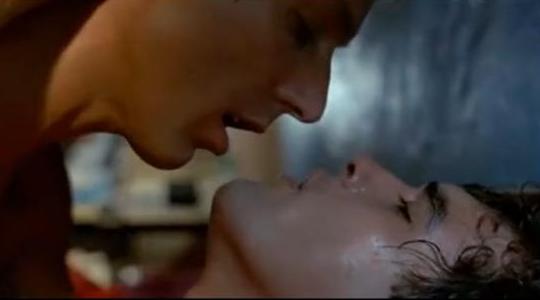
He also teaches him of sex in a rather comedic scene, much much more erotic than the opening one, a lot less explicit than it too. In the middle of the kiss, and while lying naked on the bed, Antonio remembers that Pablo is a bit “promiscuous” and asks him if he’s got any venereal diseases.
This is the 80s, AIDS is soaring, anal intercourse is about to occur and Pablo is nonchalantly certain he never had any disease caught.
(The scene is worth it, if for nothing else –and yes for everything else- for Banderas’ expressions.)
Antonio tries so hard to become what he thinks Pablo wants and needs in a lover. When he finds the letter Pablo sent to himself through Juan, he warns Pablo.
“He seems very much in love with you.”
“He’s not. The letter’s a joke.”
“Love is never a joke. I hope you’re not in love with him…”
[..]
“Don’t like to me, Pablo. Don’t cheat on me.”
“I never promised anything. I told you not to trust me.”
Same as Pablo, Antonio is in his own world in which Pablo is as in love with him as he is with him.
“Stop pretending.”
“ I know you love me. I can tell.”
“You are screaming for affection.”
“You’re better than you think.”
And when he can’t have him, he tries to have the people he loves. After Juan’s killing, Antonio is as nonchalant about it as Pablo was about AIDS.
“I don’t regret it,” he says to Pablo. “He hurt me a lot”. Needless to say, poor Juan was the only victim here.
He seems positive that now he and Pablo will be together and is surprised when he’s denied the bright future. (Dude, you killed a man!)
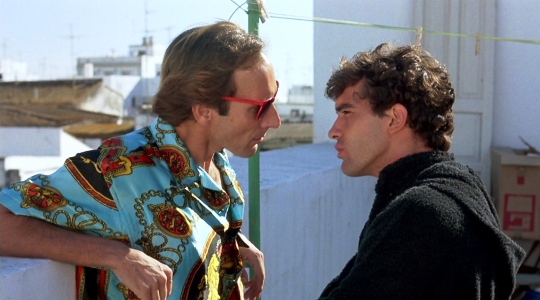
That’s the shirt, by the way. Antonio has already burnt his own while sitting in his undewear in the bathroom.
Later on, after he seduces Tina and Pablo informs her of the truth, she tells him Pablo committed suicide to manage to leave from him, Antonio’s first thought is that Pablo killed himself to protect him. For if Pablo committed suicide, he also takes responsibility for Juan’s death thus making Antonio innocent. Antonio still believes that Pablo would do that for him. He actually believes Pablo loves him. And you know what? Maybe he’s right.
The strange thing in regards to Antonio is that, despite the actor’s boyish good looks, on his own, he’s creepy. Regardless of that, though and also of the fact he’s got the most alone (without Pablo) scenes in the movie, the audience’s feelings about him change as if they have Pablo’s eyes as a guidance. We see Antonio the way we think Pablo would see him as.
Sure, he’s a stalker and he just killed a man, but you still have to have positive feelings about him. Don’t question it.
More for Antonio later.
Let’s move to my favourite part of the movie, and I guess, the director’s least favourite.
«In that way I’m very different from the director in the film. I would have to have made him more similar to the way I live and work, to make him more alive and his creative energy more vital. But I had a problem with Eusebio Poncela and this prevented me from taking him where I wanted to go. It’s something almost chemical. The director I wanted to show was a man full of life who, if he took drugs, would take a stimulant like cocaine. The problem was Eusebio was taking a different kind of drug altogether. This was very frustrating while we were shooting. I wanted to project the way I lived and the result was the opposite. This explains why the character played by Carmen Maura, initially a supporting role, unexpectedly became the represantation of desire and the vehicle for what I wanted to say. In the end, Law of Desire is still one of my favourite films, even if my personal intentions weren’t fulfilled.»
Pedro Almodóvar
Clearly, I cannot know what Almodóvar wanted for the character and whether I’d like his version better. Maybe I would. But I love Poncela’s take as well. I absolutely adore both his acting and the character.
Let’s start with the opening scene of Law of Desire, Pablo’s movie:
It’s very possible that the opening scene is not a pornographic scene. It’s as crude as you can imagine it to be. It’s also quite possibly one of the reasons I wasn’t all too warm about the movie after my first viewing. The scene though is quite telling. The old men directing the young man get aroused by telling him what to do with his body and how to do it and -of course- by what he’s doing. The person behind them is not satisfied by his performance. The young performer is satisfied by the money he got to masturbate on camera. All in all, everyone is either satisfied or unsatisfied by their own performances. There’s no interaction there. It’s pure selfishness in a filmed sexual act.
And that’s Pablo’s celebrated movie. Everyone’s love it. Tina and Juan celebrate its success with him. Antonio gets obsessed with it and Pablo waits outside the theatre wondering how it will go. Because he doesn’t watch his movies. He just makes them.
In my opinion, Law of desire (I’m sorry, Pedro) has a perfect modern tragic hero in the face of Pablo Quintero, played to perfection by Eusebio Poncela so I’m going to have to disagree with Pedro here, not because I don’t trust his vision about the movie he wanted to make and the character he wanted to create, but because in the end I absolutely fell for Pablo’s charms. Not instantly, but with the second viewing he had me hooked.
And then I watched again. And again. And again.
And I fell even more…
Pablo is a successful director and writer.
He’s unapologetically gay.
He’s a suave lover.
He’s a protective and affectionate brother and uncle.
He lives in his own world and uses life for inspiration for his art.
He’s generous and selfish.
He’s arrogant and playful.
He’s eccentric and full of faults.
He’s a decent and honest human being.
He’s an amazing character.
In my humble opinion.
The story begins with his success. People love his movie; he’s applauded by the audience. He’s on the top of his career. He’s ready to adapt the Human Voice for the stage and is writing notes for the female protagonist of his new film.
Aristotle in his Poetics defends the cathartic power of tragedy and makes moral ambiguity the essence of tragedy. The tragic hero must be neither a villain nor a virtuous man but a “character between these two extremes… a man who is not eminently good and just, yet whose misfortune is brought about not by vice or depravity, but by some error or frailty».
Hubris – excessive pride and disrespect for the natural order of things.
Hubris (ancient Greek ὕβρις) describes a personality quality of extreme or foolish pride or dangerous overconfidence, often in combination with (or synonymous with) arrogance.
From the beginning, in the summary of the movie, I wrote “Pablo fancies himself in unrequited love with Juan”. It helps his creative mind and his art to move forward and find inspiration. His movie’s protagonist, Laura P., is not only inspired by his sister, but Juan’s lighthouse is used as well. Laura is a scorned lover, and plans her revenge ever at the cost of her own health.
Pablo’s hubris is his determination to mix reality with art with little interest to the emotions of the others, especially Juan and Antonio’s, as opposed to his sister’s that are of the most importance to him. Juan not only tells Pablo he’d stay in Madrid if that’s Pablo’s wish, but he asks him three times to go visit Juan in his hometown.
We see Pablo typing in the same tune as Los Ponchos’ Lo Dudo.
“Lo dudo, lo dudo, lo dudo,
Que tu llegues a quererme,
Como yo te quiero a ti.”
«I doubt, I doubt, I doubt
that you’ll ever love me
the way I love you..”
He has made himself the victim of an unrequited love paying no attention to Juan’s love for him while he brings Antonio in the mix too. And it’s not as if Antonio seems to be the most stable of individuals. He doesn’t hide his curious, obsessive and jealous character at all. Pablo’s inability to see it is his
Hamartia – a tragic flaw that causes the downfall of a hero.
The term hamartia derives from the Greek ἁμαρτία, from ἁμαρτάνειν hamartánein, which means «to miss the mark» or «to err».
He lets Antonio in, he teaches a rather inexperienced, oppressed, small town young man how to live his homosexual desire. He sees the jealousy, Antonio’s inability to do as he is asked, but accepts to send him cards and letters while he goes home for the holidays under the name of Laura P. All the while he’s considering himself to be in love with Juan.
At some point, Antonio becomes more overbearing than usual, or maybe it’s because Pablo has planned to go see Juan… or maybe it’s because Antonio will be at his beck and call if he so wishes in the future that he tries to end things with him.
Which is something taken badly by Antonio, not overly shocking all things considered.
And that leads to Juan’s death/killing/murder.
This is how Pablo’s peripeteia begins.
Peripeteia – The reversal of fate that the hero experiences.
Aristotle, in his Poetics, defines peripeteia as «a change by which the action veers round to its opposite, subject always to our rule of probability or necessity.» According to Aristotle, peripeteia, along with discovery, is the most effective when it comes to drama, particularly in a tragedy.
After Pablo finds Juan dead, he drives instantly to Antonio’s place, where he confronts him. Antonio tries to kiss him after admitting his killed Juan (or something along these terms) and he runs away after biting him. Instead of going to the police, as someone would expect hin to do, to report Antonio, he drives back to Madrid. And we finally see the reaction we would expect him to have when he found his love dead. Tears running down his [very beautiful, blue] eyes. Behind the sunglasses he wears. A police car is right behind him –as he’s considered a suspect for Juan’s murder… did you forget the shirt?- and the officer [Juan’s friend] sees him crashing against a tree because a. he’s a lousy driver and b. he is crying his eyes out.
He gets out of the car crash with a broken leg and ribs. Also, amnesia.
OK, there are hints of melodrama as well.
Then, there’s the scene where Tina tells him her secret. When they were young they were brothers. Tina was Tino. It brings back to the audience, Pablo’s innate decency when he brought an old photo to Tina’s place of them after their fight. Despite Pablo’s tendency to use real life experiences and emotions he would never betray Tina. And we see that again now, as Tina shares they mutual childhood, how she and their father broke their family with an incestuous affair and left Pablo and his mother alone. Pablo doesn’t criticise or blame Tina about anything. He just wants to know his past.
His love for his sister is sincere and strong. He’s willing to do anything to protect her.
At some point, he remembers, and can anyone explain to me why on earth does he want to pretend he’s still not cured?
What’s this other than protecting Antonio, clearly unconsciously?
But then he’s told the man Tina has fallen for is Antonio and every ounce of pretence flies out of the window. He has to protect his sister. He calls her, tells her to stay calm, tells her who Antonio is and to try and leave.
“He’s not a bad guy, but he’s crazy.”
Let’s not forget that he talks about the man who killed his true love and fooled his sister. He, his doctor, his lawyer go with the police to Tina’s house. Antonio’s negotiation is that he wants one hour alone with Pablo.
Everyone accepts and Pablo goes up alone to find Antonio holding Tina at a gunpoint.
It’s the first time Pablo doesn’t care about Tina’s feelings. He just wants her safe. Antonio lets Tina and an injured (by Antonio) cop go away, keeps Pablo away from the window [to protect him in case a cop decides to shoot]. Pablo sits down on the chair, his leg is on a cast and as they are alone, Antonio turns on a record player to play Lo Dudo.
And as Antonio picks Pablo up from the chair, he starts singing the song, his hands on Pablo’s face.
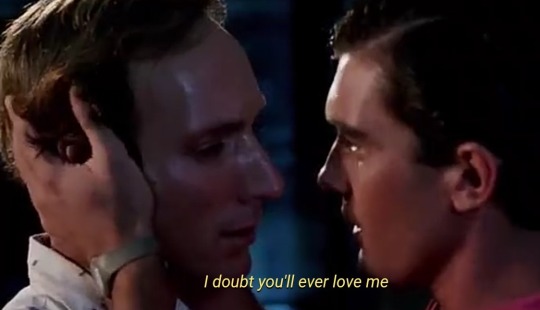
Anagnorisis – a moment in time when hero makes an important discovery in the story.
Anagnorisis (Ancient Greek: ἀναγνώρισις) is a moment in a play or other work when a character makes a critical discovery. Anagnorisis originally meant recognition in its Greek context, not only of a person but also of what that person stood for. Anagnorisis was the hero’s sudden awareness of a real situation, the realisation of things as they stood, and finally, the hero’s insight into a relationship with an often antagonistic character in Aristotelian tragedy
This is where Pablo realises two things. One, Antonio is the man Pablo pretended he was all this time. Antonio was the one madly in love. Antonio’s love was unrequited. Antonio’s love was real. And it led to a man’s death because Pablo himself was too busy pretending.
The way Pablo looks at Antonio is like he sees him for the first time. (Eusebio Poncela may be the best actor I have ever watched.) Maybe it is. And then leans on him and rests his head on his shoulder. He’s broken in ways the accident didn’t break him.
«I doubt, I doubt, I doubt
that you’ll find a love as pure
as the love you’ve found in me.»
The way he hugs Antonio is the most sincere embrace he has given the man because right then, when all is lost, that’s the moment he maybe realises he loves Antonio as well. Or.. that he could love Antonio if he had given him a second thought when it mattered. The way he holds him tight is not the way someone would hold the person who killed their true love that’s for sure.
So he lets himself be picked up by Antonio and be carried to the bedroom.
“Loving you this way is a crime
But I’m willing to pay the price
I knew it when I picked you up at the disco
I knew it’d be a very high price
But, I have no regrets
I don’t care what will happen in an hour
And you shouldn’t think about it either.”
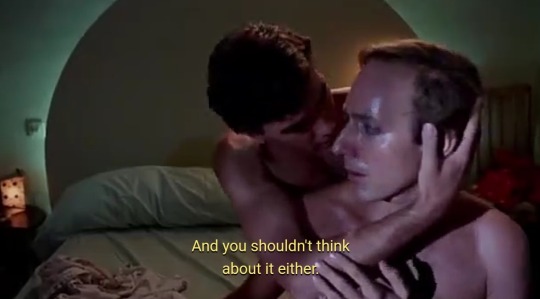
He kisses Pablo’s cheeks, eyelids slowly. “How am I doing? You taught me how.”
After the accident, Pablo’s been physical broken, in body and head, but after this revelation he’s also emotionally broken and it’s all there, in Pablo’s face.
Catharsis – feelings of pity and fear felt by the audience, for the inevitable downfall of the protagonist.
Catharsis (from Greek κάθαρσις, meaning «purification» or «cleansing» or «clarification») refers to the purification and purgation of emotions—particularly pity and fear—through art or any extreme change in emotion that results in renewal and restoration.It is a metaphor originally used by Aristotle in the Poetics, comparing the effects of tragedy on the mind of a spectator to the effect of catharsis on the body.
And I, the audience, can’t help but feel pain for both Pablo and Antonio. Because, the moment Pablo takes responsibility of what has happened by hitting his type-writer with his crutch, the moment Antonio hugs Pablo from behind on the bed while taking off his clothes, or when he kisses him tenderly just like he was taught to kiss by Pablo himself, I forget what Antonio was, and imagine what Antonio could become if Pablo was slightly more sensitive and less arrogant. Even if that’s a mind game by the director.
And I believe [because after all, this is just how I see this movie and these characters] this is what Pablo thinks as well when he embraces Antonio tightly as if he’s afraid he’s going to lose him just as he found him.
It’s clear that this isn’t going to have a good ending. For either man. Time passes and soon the hour is gone. Pablo sees Antonio putting a sheet on him because it’s cold and hears him asking him to wait because he’s going to come back to help him dress.
By the time Pablo is in full understanding of his surrounding and the fact the gun is missing is too late. He shouts Antonio’s name as if that alone is going to stop him while the other man shouts back at him “Do not come!” when a gun shot is heard.
Antonio lays almost nude, save for his underwear, in front of Tina’s Cruz de Mayo his head close to the type writer when Pablo, moving slowly and with difficulty dressed in the same manner, finds him. And as he leans over his lover’s body, he may very well be the most aesthetically pleasing male actor I have ever seen. His long limbs make him look taller than he is, his lean physique that of a swimmer’s or a runner’s. (And this comes after a full frontal nude scene that showed nothing of that sort for me…)
Tina’s altar is lit with candles, it looks as if it has caught fire itself. Antonio seems almost pure in death and, as Pablo cannot fault him for anything any longer, he finds the culprit in the typewriter, an extension if not of himself, then of his art. Pablo picks up the typewriter and throws it out the window that explodes as it lands on the rubbish can.
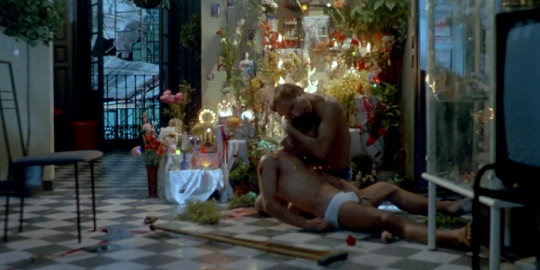
Why? Who knows? Who the bloody hell cares when we see Pablo holding Antonio’s body, kissing his most probably bloody lips with a tenderness that surpasses the kiss he taught Antonio. Pablo mourns Antonio and so do I.
Was Antonio a sacrifice?
The last time we see Pablo, he’s holding Antonio in front of the lit Cruz de Mayo, in an almost a pieta pose. In the end, the director shows that Antonio is redeemed, that his actions were a result of Pablo’s actions, of Pablo not knowing himself.
And what of Pablo?
He’s destroyed his typewriter. Thus he’s questioning his art.
His relationship with his sister is broken. The last words she told him were “I hate you both.”
The man he just realised he loved is dead.
As the scene changes to the people down the road running to help Pablo, the song changes to “Dejame Recordar” “Let me remember” by the Cuban singer and cabaret actor Bola de Nieve.
“Quien, de tu vida borrara mi recuerdo y hara olvidar este amor,
Hecho de sangre y dolor, pobre amor”
«Who will erase from your life the memory of me, and will allow this love to be forgotten ? This love made out of blood and pain, poor love… «
I have left so many aspects of the movie out of this love letter, even in regards to Pablo, one of those being the hose scene when in the middle of a hot summer night, as Pablo carries Ada on his shoulders, they see workers cleaning the road with water and Tina asks them to hose her as well. It’s a beautiful scene and, like on most of them, the audience focuses on Tina, but I’d focus on Pablo’s laughing face and mischievous, sparkling eyes seeing his sister having fun in a symbol of catharsis.
Pablo has become one of my favourite cinematic heroes quite unexpectedly, and I think he’s underrated. I wonder if that’s because of Pedro Almodóvar’s opinion.
I do care about Pablo’s future. What will become of Pablo? As a film viewer or a novel reader I love open endings. Choose your own end. In this case, I’d love to know more about what this character did to survive the tragedy.
Alas… Pedro and Eusebio haven’t spoken since. But, more of this, in Dolor y Gloria.
«Tu no tienes la culpa de no estar enamorado de mi y yo tampoco tengo la culpa de estar enamorado de ti. Por eso es bueno que te vayas. Si no te veo se me pasara.»
Starring: Eusebio Poncela as Pablo Quintero
Carmen Maura as Tina Quintero
Antonio Banderas as Antonio Benitez
Miguel Molina as Juan
Anastasia K. (November + December 2019)
Merry Christmas to all of you!
AK, 24/12/2019
